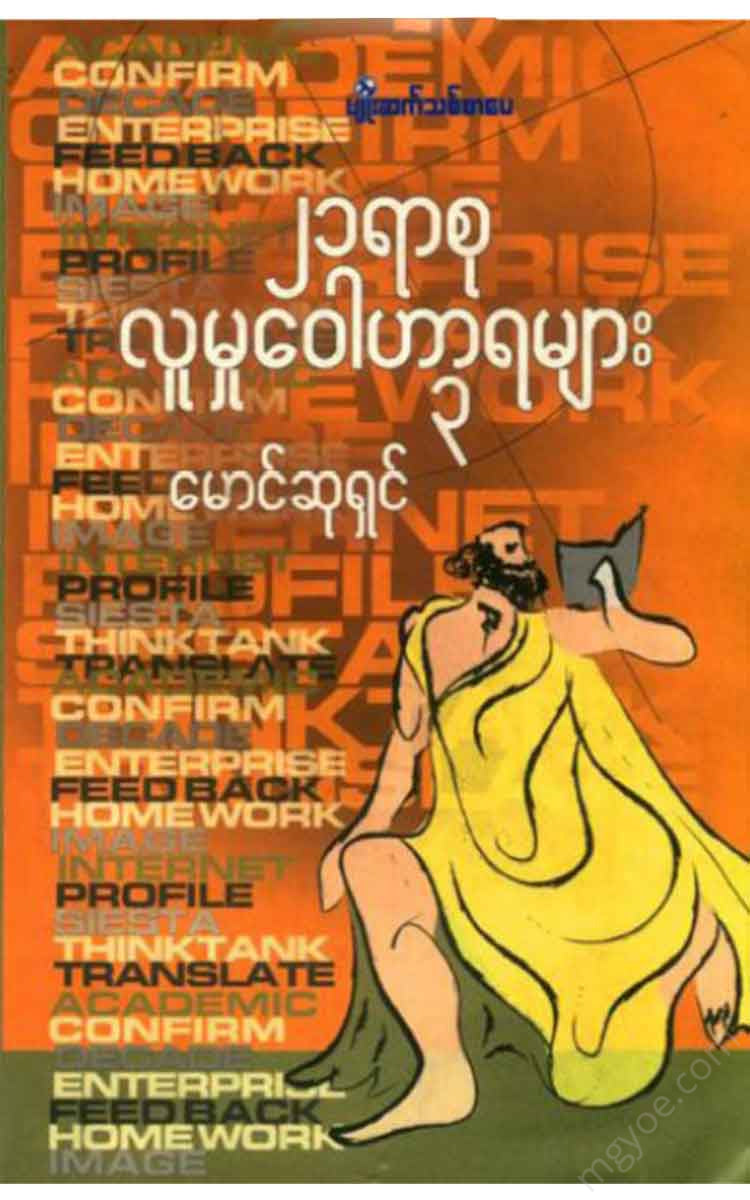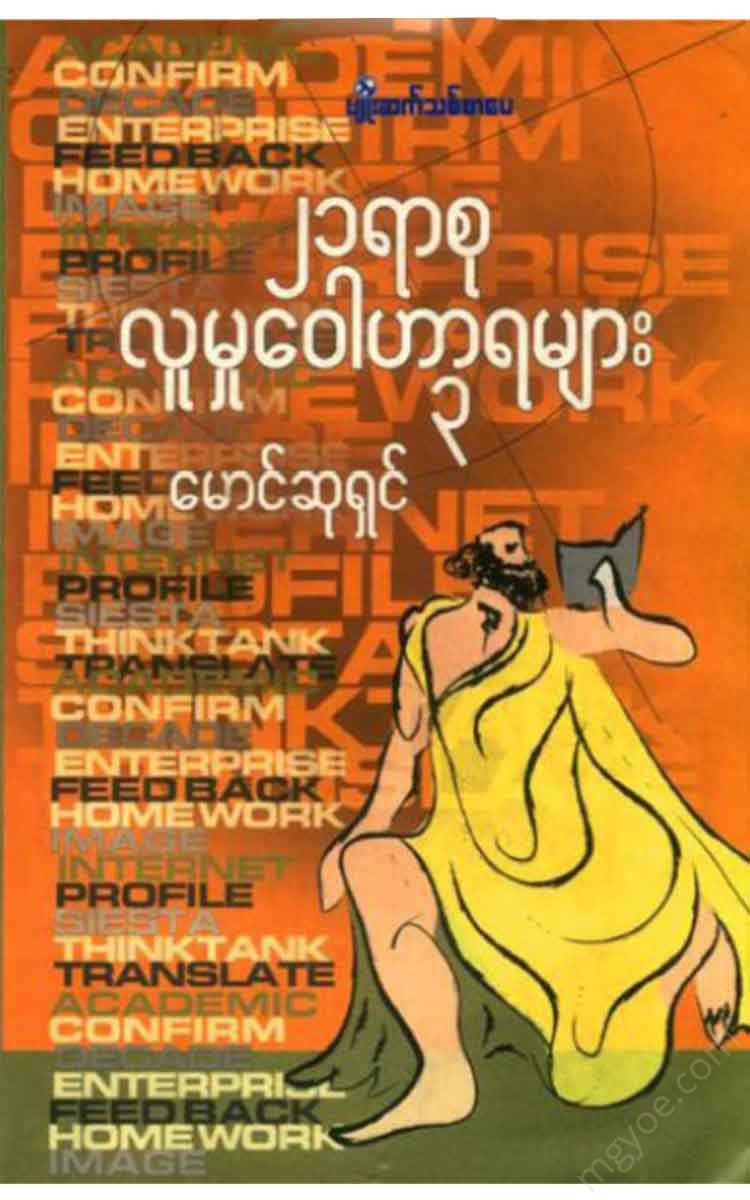Other Websites
Maung Su Shin - 21st Century Morals (3)
Maung Su Shin - 21st Century Morals (3)
Couldn't load pickup availability
Academy
Academic
The term "academics" and their group are collectively referred to as "Academia." It is a community of scholars. Scholars are respected and admired, but they are also criticized for being impractical. This is because in the pursuit of knowledge,
It's because there are people who are naturally content with their knowledge and are content with themselves. They are academics.
When used as an adjective, it means scholarly, scholarly. It is not like that because if you are not a scholar, you will not be able to live in the world at a high level. I think it is related to enjoyment. I once wrote an article called “Among the Scholars” in the form of an essay. The topic is about the way I walk among academics and lay scholars of Myanmar, and I see their speech, dress, and hairstyles in meetings and literary circles and imitate them. It is interesting, like the conversations I read in “The Late Text” by Hmawpi Saya Thein Gyi.
I think the world of academics can generally be described as the university world. In the university world, there are people who are not concerned about their appearance and are only looking for solutions to their own problems. Some of them, who are close friends, have even been ridiculed by our Burmese writers as 'professors who are empty-handed'.
There was a movie called "The Absentminded Professor" once. It's a comedy. I think it was produced by Walt Disney. It's about the story of Henry Ford, a car tycoon who invented the Model T in the late 1900s, and it flies into the sky. He invented the car. He was so busy taking care of his business that he forgot about his daily life, his housework, and his social life.
People in the academic community are so isolated that they are often referred to as people living in ivory towers.
It can be said that this word has become commonplace since then.
Although academics are often called impractical and shallow, they have contributed to everything from the jet plane to the atomic bomb in physics, chemistry, and aerospace. They have touched on practical issues. Although science is divided into two branches, namely, natural science and applied science, they continue to work together.
How much they cherished their knowledge is also shown by the fact that Euclid, who invented geometry around 300 BC, was killed by his enemies, who even entered his house during the war. He was afraid that the circles he was drawing on the ground would be destroyed, so he shouted, "Don't destroy my circles, don't destroy my circles!" and died at the hands of his enemies.
The great scientist Archimedes (27-12 BC) is said to have discovered a way to test whether gold was fake while he was still alive, and he ran naked into the street, shouting in Greek, "I have found it... I have found it." He, like Euclid, is remembered.
It was the Sicilian Archimedes who was the first to use the principle of a "rock" to move a weight, and he said, "Give me a place to stand on, and I will support the world with a rock."
It is said that he said, “I will glue it and move it.” Pythagoras (500-500 BC), a Greek scholar, also invented mathematics and astronomy.
There are those who are practical scholars, and there are those who are simply interested in their own interests and spend their time studying. There are those who spend their entire lives studying the life of the great Persian poet Omar Khayyam, and there are those who spend their time traveling the world studying the life of moths.
This kind of lifelong pursuit of knowledge is said to have been initiated by Greek thinkers. Especially teachers. Socrates, Plato, etc., were the ones who thought and sought what truth was. There were also those in Asia who were earlier than them.
In our time, there are also organizations called “think tanks” that started around 1966, where people can think and
Add value
Added Value
They use the term "advantage value" to mean "high value." I hear it and read it. It's an important part of business and commerce. If you can increase the value, it's more valuable. In terms of income, it means you earn more.
The easiest way to add value is to turn raw materials into finished products. Bamboo is not sold as a whole, but as a basket. Wood is not sold as a whole, but as furniture. Cotton is sold as yarn. Or cotton is woven into cloth. If we look at the example of the past, this is how we think about adding value.
Unlike in the past, where the production system, sales system, and service system are increasing, the concept of adding value is more complex and widespread. If you open a small shop, it is also valuable to open it on a street corner so that people in the area do not have to travel far to buy what they want. In a small shopping mall, it is also valuable to have a variety of products so that people can choose and buy various consumer goods. In that shop, you can pick and choose what you like and pay when you leave the shop, so that you do not have to keep many shop workers, so you can reduce the price of the goods and sell more. This is also valuable.
Iron ore is mined from the ground and exported abroad. Owning and extracting iron ore from the ground is also very valuable. If you melt the iron ore into steel, it will be even more valuable. And that's not all. If you make the steel into bars, rods, and plates, it will be even more valuable. If you go further, you can make the iron into cars, refrigerators, and so on, and you can make even more money.
Similarly, if an artist buys a canvas and paints it, the value of the painting may be the same. But the value is increased. So, painting on canvas and painting on canvas are very different in value.
Sometimes, the value is increased through personal preference and not by others. I will buy white furniture and paint it my favorite color. Someone who is interested in electronics and electrical engineering will buy the parts they need and build a machine of their own choice. Buying a sculpture, a finished piece, and painting and then selling it is an economic way of increasing its value.
If you know how to do it, there is a benefit for those who work hard at it first and then take it to the next level. Then, they deliver the items you need to buy to your home and pay you.

